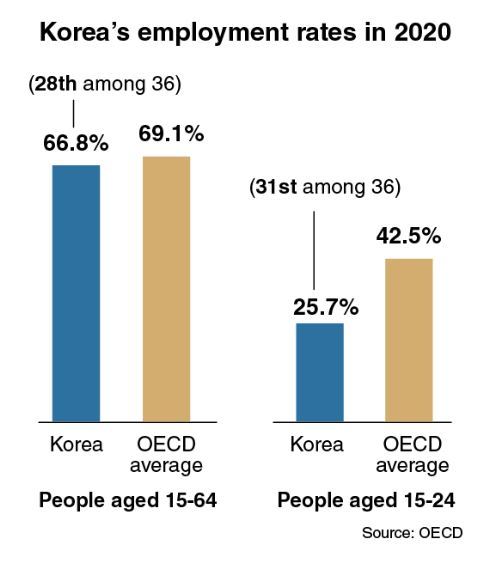
SEJONG -- President Moon Jae-in, who will complete 60 percent of his term this weekend, has continued to unveil his strong commitment to active job creation since taking office in 2017.
But, as of March 2020, the data held by the Organization for Economic Cooperation and Development showed that South Korea’s employment still falls behind the average of the 36 members. The country remained in the lower ranks for both the working-age population and young generation.
The OECD has compared the members’ employment rates -- as a proportion of the working-age population, or those aged between 15 and 64 -- based on figures from the first quarter of 2020 or the fourth quarter of 2019 according to reports from the 36 economies.
Korea posted 66.8 percent in the employment rate among those aged 15-64, which falls short of the OECD average, 69.1 percent, and the average of the Group of Seven, 72.2 percent. It ranked 28th, the same spot it occupied as in the previous comparison of figures for the first half of 2019.
In contrast, Japan saw its ranking climb from fifth to fourth with 78.1 percent in the employment rate for the age group.
Among those whose figures stayed above the OECD average were Sweden (sixth with 77.1 percent), Germany (seventh), Estonia (eighth), Denmark (11th), the Czech Republic (12th), Lithuania (17th), Latvia (18th), Slovenia (19th), Portugal (21st) and Hungary (22nd).
All of the English-speaking countries were also above the average -- New Zealand (fifth with 77.3 percent), the UK (10th), Australia (13th), Canada (16th) and the US (20th).
While Iceland topped the list with 83.7 percent, followed by Switzerland (second with 80.7 percent) and the Netherlands (third with 78.3 percent), Korea’s ranking was also behind Poland (24th), Israel (25th),
Slovakia (26th) and Luxembourg (27th).

President Moon, particularly, had promised to save no effort in creating as many jobs as possible for the younger generation in their 20s via his meetings with college students and graduates before and since the 2017 presidential election.
But youth employment for those aged between 15 and 24, compared by the Paris-based organization, represented that Korea far falls behind the average as of the first quarter of 2020.
While the member countries’ average was 42.5 percent, Korea’s employment rate for the age group stayed at 25.7 percent. It ranked No. 31 among the 36 countries.
This contrasts from figures for the US (ninth with 51.1 percent), the UK (11th with 50.4 percent), Japan (13th with 48 percent) and Finland (14th with 44.6 percent). Others that ranked above Korea included Ireland (16th), Mexico (18th), Turkey (21st) and Slovenia (23rd).
Given that Korea looks into those aged 15-29 when calculating youth employment, broader than the OECD-based 15-24, the comparison might not be significant.
But Korea’s jobless rate among the young generation has been critical for several years even if it was for those aged 15-29. The seriousness is seen from the Supplementary Index III for Employment, held by a government agency.
It shows that the “de facto” youth unemployment rate, which is published each month, ranged between 20.4 percent and 26.6 percent over the past three years.
The Statistics Korea-based index regards “underemployed” people -- who work less than 36 hours a week and want to work more hours, as well as seasonal workers who are out of work for part of the year -- as unemployed.
“The past data from the OECD indicates that Korea has been underperforming compared to most other members in the hiring sector, irrespective of the coming figures, hit by the COVID-19 disaster,” said a labor market researcher in Seoul.
By Kim Yon-se (kys@heraldcorp.com)












![[Today’s K-pop] BTS pop-up event to come to Seoul](http://res.heraldm.com/phpwas/restmb_idxmake.php?idx=644&simg=/content/image/2024/04/17/20240417050734_0.jpg&u=)




![[KH Explains] Hyundai's full hybrid edge to pay off amid slow transition to pure EVs](http://res.heraldm.com/phpwas/restmb_idxmake.php?idx=652&simg=/content/image/2024/04/18/20240418050645_0.jpg&u=20240418181020)

![[Today’s K-pop] Zico drops snippet of collaboration with Jennie](http://res.heraldm.com/phpwas/restmb_idxmake.php?idx=642&simg=/content/image/2024/04/18/20240418050702_0.jpg&u=)